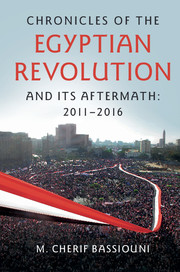Book contents
- Frontmatter
- Dedication
- Contents
- Preface
- Acknowledgments
- List of Abbreviations
- Introduction
- 1 The Early Stage of the Revolution
- 2 Mubarak Relinquishes the Presidency and the SCAF Assumes Power
- 3 A Prelude to Democracy: 2011–2012 Elections
- 4 The Morsi Presidency: June 30, 2012 to July 3, 2013
- 5 The Military's Return to Power and the El-Sisi Presidency
- 6 2015Legislative Elections and the Changing Civilian Political Landscape
- 7 The Military Institution: Its Power, Influence, and Culture
- 8 Violence and Repression
- 9 The Accountability Gap
- 10 The Justice System in Crisis
- 11 The Constitutional Quagmire
- 12 Demographics, Education, and the Economy
- 13 Geopolitical Factors
- 14 Concluding Assessment
- Pictures of the Egyptian Revolution and Related Events
- Bibliography
- Index
12 - Demographics, Education, and the Economy
Published online by Cambridge University Press: 24 November 2016
- Frontmatter
- Dedication
- Contents
- Preface
- Acknowledgments
- List of Abbreviations
- Introduction
- 1 The Early Stage of the Revolution
- 2 Mubarak Relinquishes the Presidency and the SCAF Assumes Power
- 3 A Prelude to Democracy: 2011–2012 Elections
- 4 The Morsi Presidency: June 30, 2012 to July 3, 2013
- 5 The Military's Return to Power and the El-Sisi Presidency
- 6 2015Legislative Elections and the Changing Civilian Political Landscape
- 7 The Military Institution: Its Power, Influence, and Culture
- 8 Violence and Repression
- 9 The Accountability Gap
- 10 The Justice System in Crisis
- 11 The Constitutional Quagmire
- 12 Demographics, Education, and the Economy
- 13 Geopolitical Factors
- 14 Concluding Assessment
- Pictures of the Egyptian Revolution and Related Events
- Bibliography
- Index
Summary
INTRODUCTION
This chapter is intended to give the reader a general understanding of Egypt's economic conditions in light of its current demographic trends and the challenges it faces. Data and statistics, whether from official sources or private ones, are not always reliable. The reader must therefore take this factor into account when assessing this data and these statistics. This extends to data and statistics from international sources, whether public or private. They must all be viewed with some reservations. What is presented in this chapter is considered acceptable and within a reasonable margin of error. Thus, the existence of some questionable data does not affect the overall analysis, expectations, and projections contained in this chapter.
Another relevant observation is that all too frequently, and also through the years since the end of 2005, data and statistics about Egypt's economic, financial, and demographic matters, among others, have been contradicted and changed at will by government agencies to support official policy. Thus, there is some political manipulation that is unchecked by a free press that has, for political reasons, been largely suppressed.
To this noneconomist, one of the many mysteries of Egypt's society is what's missing. What we know is doubtful and seldom corrected. That which is apparent seems real only because it is contingent on what is not apparent. But regardless of how one looks at the demographic, economic, and financial data, and no matter how inaccurate some numbers might be, the outlook for Egypt does not look positive. Although this is a fact that all too many people prefer to ignore, nobody can deny that today's Egypt needs fixing.
The el-Sisi regime is very much aware of the challenges and is trying its best to address them under difficult circumstances. What is described below cannot be blamed on the present regime because it is an accumulation of decades of unaddressed or poorly addressed problems that have festered for far too long. According to The Economist, “The budget deficit has topped 10% every year since 2011; in mid-2015 Egypt's combined domestic & foreign liabilities pushed past 100% of GDP.”
- Type
- Chapter
- Information
- Publisher: Cambridge University PressPrint publication year: 2016



